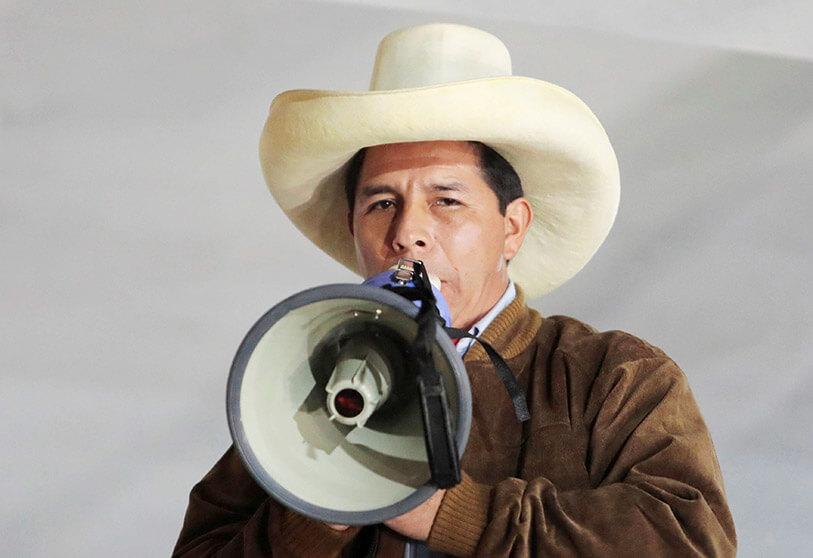RIO DE JANEIRO, BRAZIL – One week after the inauguration of Peru’s new president, socialist Pedro Castillo, doubts persist about a possible radical direction his government may take. This has generated concern in the private sector, according to reports from analysts and banking sector sources.
The most recent report by risk analysis firm Eurasia Group explains that “there are no guarantees that Castillo will distance himself from the more radical arm of his party [Peru Libre] and opt for a more moderate policy agenda,” not even with the appointment of Pedro Francke as Finance Minister.
Read also: Check out our coverage on Peru
After his appointment to the post, Francke, a 60-year-old economist perceived as a moderate leftist, stated that private property would be respected, and the proper functioning of markets and private investment will be promoted.

However, Eurasia considers that “there is no clarity on the degree of autonomy that Francke will have,” due to two factors: the fact that Castillo appointed Guido Bellido, a pro-government legislator investigated for “apology to terrorism” and accused of being misogynist and homophobic, as Chief of Cabinet; and “the influence that the radical Marxist Vladimir Cerrón, founder and general secretary of Perú Libre, will exert in the decision-making process”.
For Diego Macera, economist and Master in Public Policy at the University of Chicago, “Castillo chose as ministers very questionabke, radical people, with no history” whose “only common link was their adherence to the political process of Perú Libre”. “That made the main fears about Pedro Castillo as president more real and distanced him from the moderation that some had anticipated,” he told AFP.
The doubts for the short term may mean “the postponement of investments” and an economic result in the third quarter of 2021 not as encouraging as expected, considers economic analyst Jacinta Hamann, consulted by AFP.
The new government has the challenge of reactivating an economy that plunged 11.12% in 2020, strongly hit by the pandemic, increasing poverty and informality.
According to Hamann, “the definition of the cabinet surprised everyone, economically and politically. The strength of the chips moved to Vladimir Cerrón’s side have increased the distrust regarding the line that the president could take”.
From the business association IPAE, its president Elena Conterno emphasized that “it is regrettable that President Castillo has appointed as President of the Council of Ministers [Chief of Cabinet] a person prosecuted for terrorism apologizing, who considers that there is no dictatorship in Cuba and who has made misogynist and homophobic comments.”
“Undoubtedly, this is affecting the country’s economy, but above all, it brings a lot of uncertainty as to whether Peruvians will be able to live in peace and freedom,” he added.
NEGATIVE EXPECTATIONS
Hamann points out that “uncertainty in the markets is marked. Although part of the effect of Castillo’s arrival had already been discounted, investment is going to stop, and the outlook is negative for the risk rating agencies”.
For example, the delay in the appointment of Francke as Finance Minister, one day after the majority of the ministerial cabinet, caused a drop of almost 6% in the Lima Stock Exchange, and the exchange rate has since surpassed the four soles per dollar barrier.
The uneasiness continued despite gestures such as that of Minister Francke, who met this Monday with the respected president of the Central Bank, Julio Velarde, to coordinate the joint work that “gives tranquility to the market and investors”.
In a statement about the meeting, Francke assured that Velarde favors remaining in charge of the issuing entity, as Castillo would have asked him to do.
SLOWER GROWTH
All this uncertainty is causing “concern” among the private sector, according to sources linked to banking, who also underlined that there is skepticism about Francke’s room for maneuver in the face of an eventual agenda of a radical left-wing government.
“The third quarter of 2021 was supposed to be one of greater economic activity, with expectations of recovering growth. But now it is likely to be less marked, and all economic agents will prefer a conservative attitude until the political space becomes clearer,” says Hamann.
He explains that the stock market has been shrinking, with fewer operations, and with a financial system that, although solid, has “the challenge of generating healthy credit portfolios in an economy that has not yet recovered” from the blow of the Covid-19 pandemic.
The government must pass its first litmus test in a month, when the cabinet goes to the opposition-controlled Congress to ask for a vote of confidence, without which Castillo will have to reshuffle his team.
Source: afp

